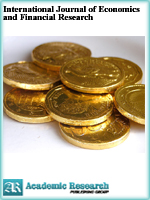International Journal of Economics and Financial Research
Online ISSN: 2411-9407
Print ISSN: 2413-8533
Print ISSN: 2413-8533
Quarterly Published (4 Issues Per Year)

Archives
Volume 2 Number 2 February 2016
Impact of Oil Price Volatility on Macroeconomic Variables and Sustainable Development in Nigeria
Authors: Eneji Mathias Agri ; Mai-Lafia Dimis Inusa ; Nnandi Drenkat Kennedy
Pages: 33-40
Abstract
The main objective of this study is to determine the impact of oil price volatility on macroeconomic variables and sustainable development in Nigeria. The significant role of oil in the Nigerian economy cannot be overestimated. Though there are studies by other researchers on oil prices and macroeconomic variables, their findings are contentious and country-specific. Our literature review and methodology shade lights on these positions. We used secondary time series data in a vector auto regression analysis. We found that fluctuations in oil prices do substantially affect the real GDP, exchange rates, Unemployment, Balance of payments and interest rates in Nigeria. Negative shocks in the international oil market, have significant impact on price fluctuations. Due to increased imports in the Nigerian economy, inflationary pressures are inevitable and are pronounced. Government revenues and expenditures have decreased significantly. We recommend diversification of the economy and energy sources for sustainable development in Nigeria.
The Economic History of Alexander the Great Expedition
Authors: Ioannis N. Kallianiotis
Pages: 16-32
Abstract
The philosophy of Economics and economic policy were developed by Xenophon in Ancient Greece. Alexander the Great was living a little later in the 4th century B.C. and we know him as a great Hellen king, civilizer, and “forerunner”; but, he was, an excellent economist because he had to manage the economy of his enormous campaign from Greece to India and to exercise an efficient and effective public policy for his vast Empire. Also, “he desired not pleasure or wealth, but only excellence and glory”, which was the moral and ethical Greek philosophy of his time. Alexander had said that “…I am grateful to gods that I was borne Hellen…” and had all these Hellenic values, which made him one of the most important person in human history. He had shown outstanding management capabilities, with rates of salaries, health and welfare, building projects, supplies, transports, reforms of the tax system, indirect taxes and donations, loans, minting of coins, even controlling financial scandals and other information useful for our policy makers, today. We measure his budgets by using the weights of gold and silver coins and determine and compare prices by taking these information from different historians of his time. Alexander economic policy with its surpluses is very useful for our current leaders and scholars. Also, the history and the role of this extraordinary man and the contribution of the Greek civilization and language in God’s plan, for His revolted and deluded creation and humanity to be in a position to understand and accept His revelation, which Greeks were expecting since the Golden Century of Athens, is discussed.



